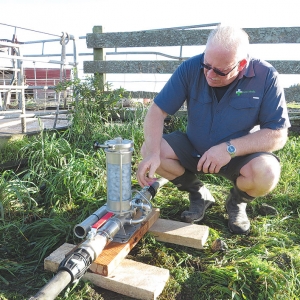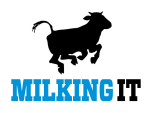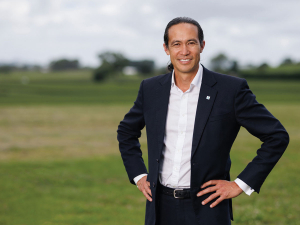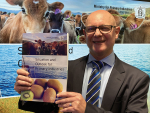The co-op says it is working with 2100 farmer suppliers who are on ‘temporary water exclusion’; on these farms mandatory management plans ensure raw water does not contact milk.
Milking shed water is assessed by Fonterra for E. coli, colour and clarity/sediment; farms with non-compliant water are moved into temporary water exclusion status.
Fonterra’s general manager milk supply technical and assurance, Dianne Schumacher, told Dairy News the co-op is working with farmers on this issue, “assisting with the development and implementation of solutions to help our farmers move off temporary water exclusion”. The solutions include water treatment and filtration options.
Federated Farmers Dairy chairman Andrew Hoggard is surprised at the high number of farmers on temporary water exclusion, but comments that not many farmers think about draining and cleaning-out water tanks. “Farmers need to think about this more.”
Hoggard’s farm was last year put into temporary water exclusion; after cleaning out the milking shed water tank his farm got an all-clear.
On his Manawatu farm, water is pumped from bore holes to the tank and then piped to the milking shed. On some farms water is piped directly to the shed from bore holes or rivers. Hoggard insists clean water for rinsing and washdown is essential for producing high quality milk.
Schumacher says Fonterra’s proactive efforts to maintain high milk quality are “in keeping with the direction of Ministry for Primary Industries standards in this area, [and] while temporary water exclusion does not pose additional risk to milk quality it does involve additional testing.”
Fonterra is not requiring all affected farmers to move out of temporary water exclusion by the end of this season but the co-op says the number of its suppliers operating on temporary water exclusion has fallen by 36% this season.
The co-op refused to say whether it would stop collecting milk from farms on temporary water exclusion.
“Fonterra will continue to work with these farmers but some may not be able to move from temporary water exclusion. In such situations they will be managed in accordance with relevant regulatory requirements,” Schumacher says.
On the cost involved in achieving water-compliant status, Schumacher says this will vary widely according to the individual farmer’s situation.
Farm Medix, a supplier of water quality plant for dairy farms, sells a water disinfection system called Farm Chlor which dispenses and doses chlorine and monitors chlorine levels.
Director Natasha Maguire knows Fonterra wants farmers to measure chlorine to avoid residue issues in milk. But she points out that throwing a pool chlorine tablet into a water tank would be “a crude way” to address water quality issues onfarm; this is not an approved chemical and would put the milk supply chain at risk, she says.
“We need to consider the supply and integrity of a water system. The water can be contaminated at source or during storage. With tablets, once you throw a tablet in you cannot see when it has gone.
Our system tests the levels of chlorine in the water. “Chlorine will be dispensed into water and you will be able to control the concentration; you don’t want very strong chlorine for the first week and none in the weeks after, which is [what happens if you throw] a tablet into the tank.”
She believes not all farmers are taking the temporary water exclusion issue seriously. “We think a lot of farmers don’t realise water exclusion was only supposed to be temporary; you’re actually supposed to do something about it. The writing is on the wall that Fonterra is going to be stricter about this.”
Fonterra farmers on temporary water exclusion are paying $100/month from their milk cheques for extra water tests. Maguire says her company has heard that the monthly test payments could rise if water quality does not comply with the standard. Compliance before the end of the season could result in penalties being refunded.
“On the bright side, farmers can also get good gains from water chlorination, which also inhibits algal bloom in bore, creek or dam water for stock water troughs,” Maguire explains. This keeps the water palatable for stock and helps deal with the bacteria carried by birds.
Meanwhile, Fonterra farmers on temporary water exclusion cannot use raw water for rinsing plant after cleaning-in-place (CIP).
Raw water also may not be used for flushing plant at the start of milking, flushing milk from the plant to the vat at the end of milking, or for any other purpose where it may contact raw milk intended for supply.
A farmer on a temporary water exclusion policy will:
Have a lower trigger level for demerits for the freezing point test. This means suppliers on water exclusion have more chance of freezing point demerits
Incur a monthly charge of $100+GST deducted from milk payments to cover the cost of the extra testing and monitoring
Need to run milk to waste at the start of milking and/or treat final rinse water
Need to treat all rinse water in wash tubs before it enters the plant or vat. A dose of approved liquid chlorine at a minimum of 5ml/100L of water must be added to make water suitable for rinsing detergent residues
Have a written document outlining the farm’s detergent rinsing procedure.
Fonterra’s advice
Fonterra wants farmers to:
Find out the specific nature of the water problem
Establish the cause(s) of the problem
Identify options for solution
Talk to a Fonterra farm dairy assessor or a Fonterra regional food safety manager.


















